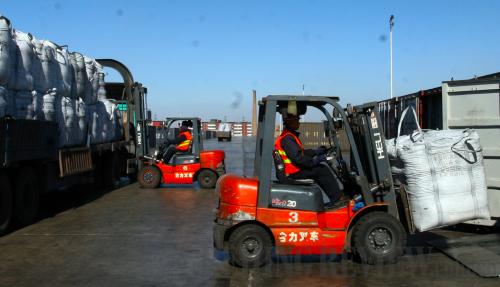|
 |
|
EXPORT STRENGTH: Trucks move cargo ready for export at Shizuishan Landway Port. The port has witnessed more than 3.2 billion yuan ($492.3 million) worth of exports in the past three years (LIU QUANLONG) |
Minister of Commerce Chen Deming predicted a smaller trade surplus for this year at a press briefing earlier this year.
"China has been enhancing efforts to rebalance its economy and pave the way for imports to outpace exports," said Chen. "Uncertainties are also hanging over export prospect, including simmering protectionism and debt woes in Europe."
"The terms of trade are getting worse for China on surging oil prices, so China's trade surplus could shrink much faster than the market has expected," said Lu Ting, an economist with the Bank of America Merrill Lynch. "Monthly deficits are still possible, but for the full year, China's trade will most likely remain a surplus. We now see more downside risk to our forecast of $150 billion trade surplus in 2011."
In an earlier report, Merrill Lynch estimated every $1 increase in oil price per barrel may cut China's annual trade surplus by $1.9 billion.
In 2010, the country reported a trade surplus of $183.1 billion, compared with $295.5 billion in 2008 and $196.1 billion in 2009.
Wei Jianguo, Secretary-General of the China Center for International Economic Exchanges, expected less than $100 billion in trade surpluses for 2011.
"Appreciation pressures of the yuan and domestic labor cost inflation are casting an ominous shadow over exports," he said.
"The export outlook may get better in the latter half of this year," said Wang Qing, a Morgan Stanley economist in Hong Kong. "Since 2002, China has been reaping two thirds of its annual trade surplus in the latter half of each year."
Rebalancing commitment
With the trade surplus diminishing, China's attempts to rebalance the economy are yielding results.
"Current account surplus is expected to contribute 0.3-0.5 percentage points of China's GDP growth this year, down from 0.7 percentage points in 2010," said Li Huiyong.
"The biggest risks facing policymakers are inflation and overly tightening policies that may put a drain on the economy," said Li. "But now it appears that both risks are under control since the economy is steering a steady course of growth."
The GDP is likely to grow 9.6 percent this year, with the inflation problem held at bay, added Li.
Cao Yuanzheng, chief economist with the BOC International Holdings Ltd., forecast the Chinese economy will grow around 9 percent this year, with no more than 0.4 percentage points coming from net exports.
Stephen Green, a Shanghai-based economist with the Standard Chartered Bank, said the export sector is no longer a growth engine for the Chinese economy.
Exports' contribution to China's nominal GDP growth will decrease from nearly 3 percentage points in 2010 to 2 percentage points this year, he said.
The quarterly deficit is a signal China's trade imbalance is easing and its policies of stabilizing exports while propelling imports has taken effect, said Feng Lei, a research fellow with the Institute of Finance and Trade Economics under the Chinese Academy of Social Sciences.
But the country still has a long way to go to rebalance its economy since the deficit is in large part a result of surging global commodity prices, he said.
More efforts are still needed to improve the country's foreign trade structure, such as increasing imports of advanced technologies and exports of modern services, said Zhang Yansheng, Director of the Research Institute of Foreign Economic Relations under the National Development and Reform Commission.
"While it continues promoting imports, China will spare no effort to bolster the quality and value-added of exports, and at the same time heighten brand recognition of Chinese products," said Yao Jian, spokesman of the MOFCOM. | 